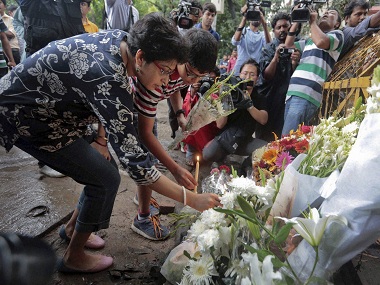Faraaz Hossain has become a pseudonym for courage and character. The 20-year-old student who was killed by terrorists in Dhaka after he refused to leave without his friends is a hero; he is the stuff of legends.
On the surface, his decision to stay and die might strike some as foolish. After all, he was an outstanding business student at Emory College near Atlanta in the US, assured of a lucrative career and a social status. As Faraaz Hossain’s elder brother, Zaraif told an interviewer ( The Times of India ), he was “destined for greatness”. All he had to do was walk away when the terrorists decided to let him go for being a Bengali and a Muslim, who could recite from the Quran.
That was the easy option, but that is not what heroes do. To embrace death while making a stand for what is right is what matters in the frame of eternity. It is why names such as Faraaz Hossain (the grandson of the Prophet, for whom Faraaz was named) and Spartacus live on for centuries as icons across the globe.
It is the sort of courage that Mahatma Gandhi showed when he walked across Calcutta and Noakhali to stop the rampaging and murderous communal mobs in 1947. Years of introspection, spiritual cleansing and a struggle for an all-embracing freedom had prepared Gandhi for that act of great personal courage. Nothing in Faraaz Hossain’s privileged young life is likely to have similarly prepared him.
It is in unexpected moments of great challenge that one’s character is truly tested, though. And in that instant when Faraaz refused to leave with the grant of his life by murderous terrorists, he turned into an immortal hero — the kind about whom poems, dramatic works and epics are written, and whose legends are passed on to wide-eyed children.
Through his simple refusal to walk away, Faraaz Hossain turned on its head the narrative the terrorists might have wanted about their slaughter at the up-market Holey Artisan Bakery in Dhaka’s diplomatic enclave. From a horrifying tale of mayhem, Faraaz’s sacrifice turned it into a story of heroic courage in the face of evil. He transcended evil through self-sacrifice, echoing the example of many of the prophets and saints of the Abrahamic tradition.
Even as investigators are still piecing together what happened, a bakery worker is reported to have told a television channel that when he noticed a man had just slipped into the gate with weapons, he ran to the back shouting. Then he, along with many of his co-workers and others ran out the back way. Many of those who stayed put in the restaurant perhaps could not follow what that worker was shouting. However, it would seem likely that, being Bengali, Faraaz Hossain would have followed what the man was yelling. It is a measure of his character that he stayed with his friends instead of scampering off.
One of those friends was Abinta Kabir, who hailed from the US. The other was Tarishi Jain, an Indian student at Berkeley. Tarishi made a heart-wrenching telephone call to her father describing the terror and panic that night. It is possible that one of Faraaz Hossain’s motives in not leaving his women friends when the terrorists allowed him to go was that he felt responsible as a host of these visitors to Bangladesh. If so, he upheld the highest traditions of hospitality for which the subcontinent and some other parts of the world (including Bedouins) take pride.
It will be extremely tough for Faraaz Hossain’s family, relatives and friends to cope up with this tragic loss of a bright young life that was not quite yet in its prime. When grief does subside, however, they can take great pride in having been associated with an iconic hero of our troubled times. His name will surely be written in gold wherever civilisation and what we call humanity survives and thrives.


)




)
)
)
)
)
)
)
)